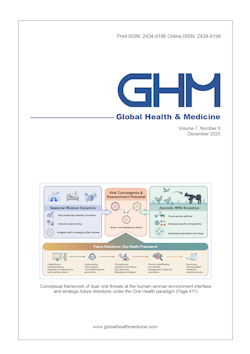Global Health & Medicine 2025;7(5):391-394.
Measles containing vaccine hesitancy and readiness in the post-COVID-19 era: A 7C model commentary
Velikov PK, Tomova-Angelova I, Ezekwe CL, Ichikawa M, Hori A
The coronavirus disease 2019 (COVID-19) pandemic exposed the fragility of global immunization programs and intensified measles vaccine hesitancy, with global measles-containing-vaccine first-dose (MCV1) coverage falling from 86% in 2019 to 81% in 2021, with the number of unvaccinated children rising to 18 million. Using the 7C model of vaccine readiness, we highlight how Confidence, Complacency, Constraints, Collective responsibility, risk Calculation, Compliance, and Conspiracy beliefs shape parental decision-making in the post-pandemic era. Declining trust, low perceived disease risk, misinformation, and service barriers threaten progress towards measles eradication. We argue that recovery requires more than restoring coverage: resilient immunization strategies must address both structural barriers and psychological drivers of hesitancy. Clinician-led communication, accessible and free vaccination services, targeted social media engagement, and transparent informational dashboards are all essential tools for achieving effective disease management. Ultimately, vaccine readiness is not only about access – it is about trust, values, and resilience. Without decisive action, measles control will remain vulnerable to future global crises.
DOI: 10.35772/ghm.2025.01056







